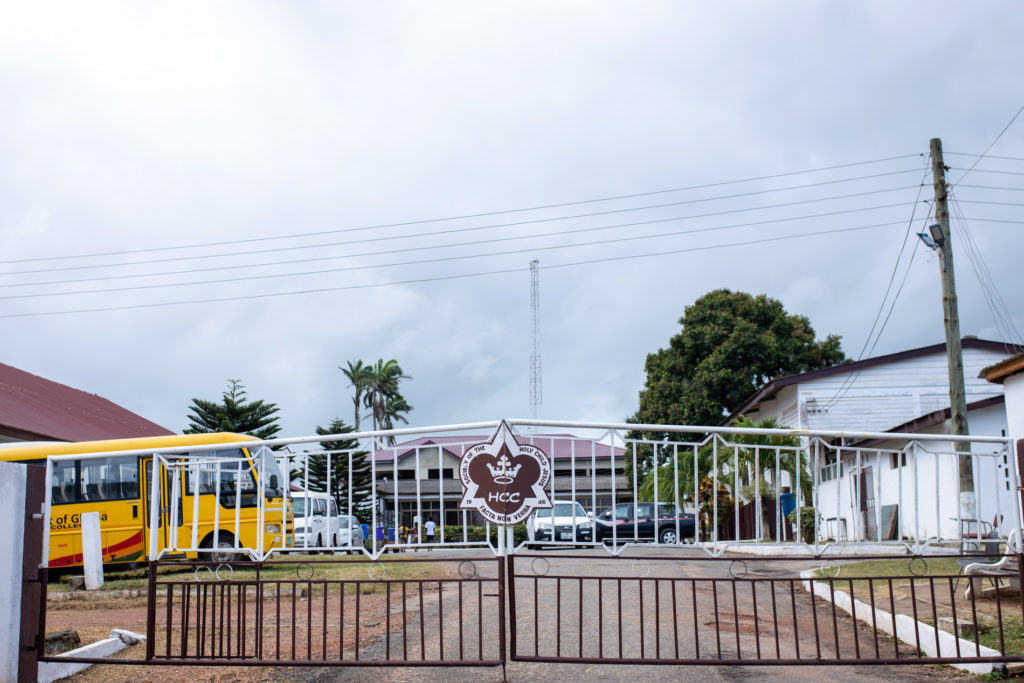History

To meet the increasing demands for wider educational facilities for Catholic girls, a re-organisation of existing educational establishment, and the provisions of new schools became an urgent necessity. Many female teachers were needed to help teach in schools, where the shortage of teachers was acute. It was for this reason that as far back as 1934, Bishop Porter of the Gold Coast Colony vicariate appealed to the Rev. Mother General of the Society of Holy Child Jesus to open a
teacher training college for girls in his vicariate. On 12th of August 1945, the foundation stone of Holy Child School (the combined catholic teacher training and secondary school for girls) was solemnly by his Lordship William Porter and laid by the Honourable T.R.O Margin, Chief Commissioner of the colony. The first batch of three nuns, Rev. Mother Mary Joachim, Mother Mary Cyril and Mother Mary Edwards landed in Takoradi on February 20th, 1946. On 5th march 1946, Holy Child College and School were established together in Cape Coast by the Rev. Sisters of Holy Child Jesus, a society which was regarded as a first class teaching order for girls in England. On Friday 21st June 1946, the college was formally opened by his Excellency, Governor Sir Allen Burns, the then governor of the Gold Coast. His lordship William Porter encouraged parents to send their daughters to Holy Child College because of the good education they gave to girls. By 1955, the number of students in both the college and the secondary school had doubled. It therefore became necessary to transfer the training college department to
Takoradi. On 18th February 1955, the college was moved to its present site on top of Fijai Village Hill to share borders with Archbishop Porter Girls Secondary School, Fijai Secondary School and Kweikuma village. In Takoradi, the following courses were offered namely certificate ‘B’ 4 – years post middle, certificate ‘B’ 2 – years post-secondary and certificate ‘A’ 2 – year post-secondary. In 1960, the certificate B was stopped as a national policy thus allowing for subsequent increase to be
made in the enrolment figures for the other courses. In 1963, the college started a special four-year home science course aimed at producing teachers for the home science centers throughout the country. This course was also stopped by a government decision in 1968 to be replaced by a two-year specialist course for certificate ‘A’ teachers. This was done to de-emphasize the certificate ‘A’ four-year course and several colleges stopped admissions to the course in 1974. In the same year, a two-year vocational specialist and a two-year home science courses were introduced only to be stopped later as a result of changes in government policy. Following the recommendation made by the Dzobo Committee on educational reforms, a three-year post-secondary certificate ‘A’ was started which was aimed at producing teachers for the proposed experimental junior secondary schools. Various factors mitigated against the success of this course and it was therefore discontinued in august 1974.
New post-secondary course structure was then drawn up to foster specialization in the various subject areas. Thus, Holy Child College was selected to offer home science. The certificate ‘A’ four-year post middle course was re-introduced in September 1981 until 1993. In 2012, the Colleges of Education Act (ACT 847) was passed to give legal backing to the conversion of Teacher Training Colleges to Colleges of Education, which were then placed under the control of the National Council for Tertiary Education – the government agency responsible for the regulation of tertiary education in institutions. Currently, the College runs
the four-year Bachelor of Education Degree programme. Subsequently, the Colleges of Education have been affiliated to 5 Public Universities in the
country. Holy Child College of Education is affiliated to the University of Cape Coast. The founders of this college believed in the holistic training of the human being and therefore in educating students, the college authorities emphasize academic excellence, promote sports and games and moral and religious education to ensure the total formation of all students.
